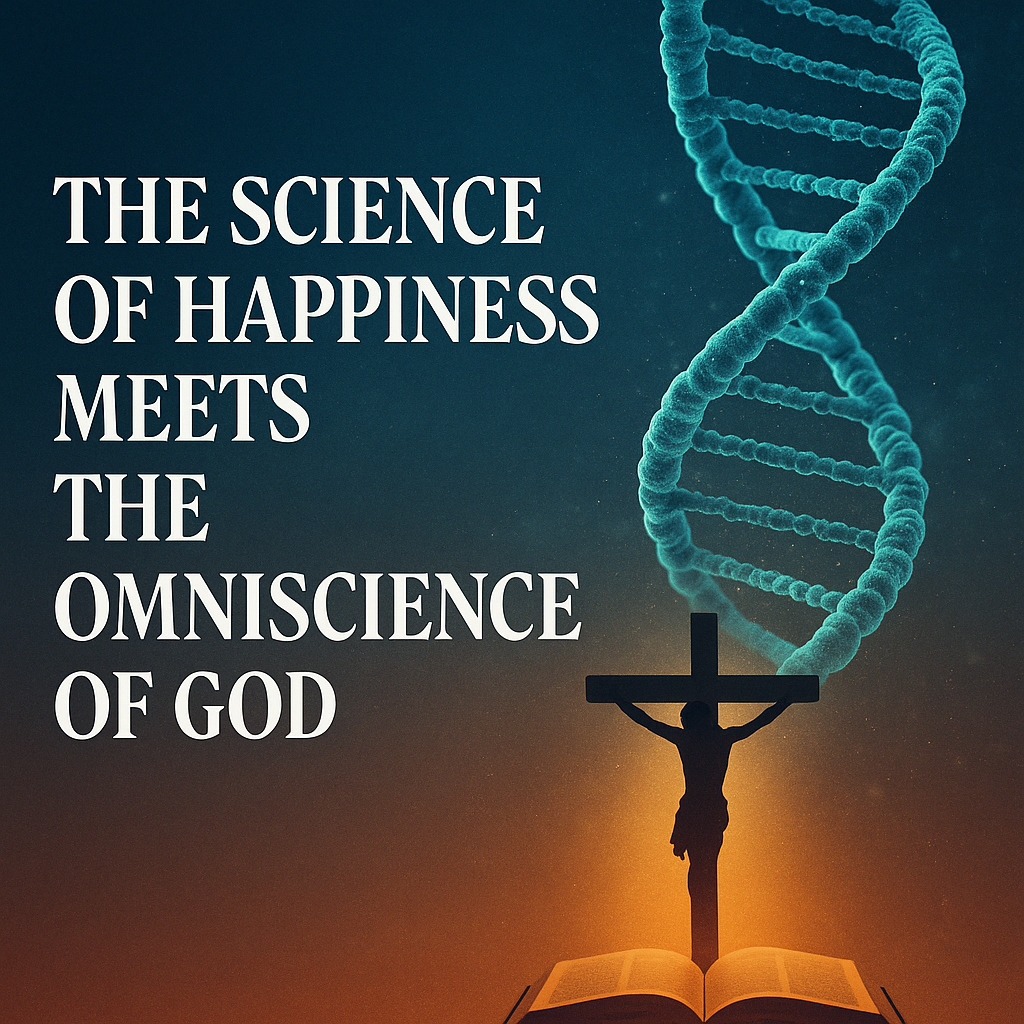
Text: Acts: 9:1-21
Theme: “The science of happiness meets the Omniscience of God” – 1: Faith
___________________________
Intro: Today we begin a new sermon series: The Science of Happiness Meets the Omniscience of God. This idea grew from a talk given by a Harvard professor — a neuroscientist and researcher in the field of happiness. He teaches at the business school, but instead of focusing on wealth, success, or achievement, he tells his students that true human flourishing comes from four key pillars: faith, family, friendship, and meaningful work. His research shows that people who invest deeply in these areas tend to experience greater happiness and life satisfaction.
Hey, this is not your pastor talking, it is a Harvard Professor and researcher! Well, this professor is a Christian, so perhaps it is not coincidence that his findings echo what Scripture has proclaimed all along. In a way, science of happiness is catching up to truths that the Bible has declared for thousands of years. Faith, family, relationships and work are at the heart of the Christian message and Christian living.
In this series, we explore where the science of happiness meets the omniscience of God. In one hand, it talks about what the Word of God already teaches us. But there’s more. The Christian faith doesn’t just agree with these pillars — it transcends them. If you look at the Ten Commandments, for example, the first three are about faith in God, and the rest guide our relationships, family, and daily work. Through faith, God has always been at work in our family, relationships and in our daily vocation
1 – Faith
Today, we begin with faith.
Here’s what the professor says about the importance of faith in relation to happiness.
He says faith is necessary — it’s not optional for human well-being. Everyone believes in something, even those who claim not to. Faith gives meaning, direction, and stability to our lives.
He also says faith lifts us beyond ourselves. We’re not meant to be the center of our own universe. Faith pulls us out of self-centeredness and connects us to something greater — something beyond our limited understanding.
And third, he points out that faith helps counter the rising narcissism in our culture. He observes that we’re becoming more self-absorbed, more obsessed with image, success, and personal gratification. Faith challenges that by calling us to humility, service, and something bigger than “me.”
Those are interesting points. We would agree that faith is necessary—it is impossible to live without believing in something. In fact, no one does. It is important that faith lifts us beyond ourselves and helps us see something greater and more meaningful. Indeed, we need to address the rampant narcissism, selfishness, and “me first” mentality that has become the norm in our society.[1]
But even though these are good points, they are not enough. If faith is only about helping you cope with life or find purpose, then it still depends on you—you finding your faith, your striving, your holding on. That kind of faith might help you live better, but it can’t give you eternal life.
The Bible offers something better—something greater. For not all faith is created equal. Let’s look at someone who had some “faith”— but needed something far more. Not just a tool to feel better and pursue happiness. He needed a Saviour. Here’s where the science of happiness learns from the Omniscience of God.
2 – The Science of happiness learns from Omniscience
First, the definition of omniscience: it means “all-knowing.” God knows everything. He is not guessing about your needs, your fears, or your purpose — He knows them fully.[2]
Now, in Acts today we saw the story of the conversion of Saul, which we know by the name Paul. This pharisee had “faith”, and was diligent in fulfilling what he thought his faith required from him. But his faith was not faith in Christ. He wasn’t even looking for it. He wasn’t searching for it. He was breathing threats and violence against the Church. He was on his way to arrest more Christians.
He had faith, didn’t he? Strong convictions. A religious heritage. A sense of purpose. He believed he was doing the will of God. But ”Faith” is not enough. If it transcends us from ourselves, but only to a certain point: the size of our mind and the nature of our own abilities
But then, the Way came to him. Not a better version of religion. Not a technique to feel more whole. Jesus found Saul. Knocked him down. Blinded him — and opened his eyes. Not just to new beliefs, but to a new life.
Saul didn’t shift his worldview — he was reborn. In that moment, Saul met the fullness of life — not because he was seeking it, but because Christ sought him. Faith is not found, but received.
This is where the omniscience of God teaches the science of happiness. When the world talks about faith, it usually means you find something meaningful and then believe it. But God’s gift of faith came when you weren’t even looking. Because it’s a gift. And it takes you not just beyond yourself, but into the very heart of God’s eternal plan.
That’s what sets Christian faith apart. Faith is not just what you do to find meaning. Faith is a gift God gives to bring you into His meaning. Because for Christians, faith is not merely about finding peace or perspective. It’s not just about “stepping outside of ourselves.” Faith is about being found by Jesus Christ. It’s about the living God who knows us, who calls us by name, and who creates in us a new heart. Faith is not a work that you produce to give meaning to your life. Faith is a gift that gives your life meaning, purpose and eternity.
While the world says, “Find what works and believe in it,” God says, “You were lost — and I came to find you.”
3 – The True Gift of Faith
So yes — faith is essential. It gives hope, courage, and strength. But more than that:
Faith in Christ gives resurrection.
Faith in Christ gives forgiveness.
Faith in Christ gives fullness of life — now and forever.
In the fullness of time, God sent His Son. Not to give us coping tools, but to give us Himself. Not to show us how to climb up, but to descend, lift us from death, and seat us with Him in the heavenly places.
Faith brings you joy, because it doesn’t depend on your strength. Faith brings you peace, because it’s peace that surpasses understanding. Faith brings you meaning – Because meaning is not thought, or ideology. It is a person: Jesus
4 – Questions about Faith and Omniscience:
You may find people who still could ask the following questions regarding this theme. Here are possible answers:
- “If science already shows us how to be happy, why do I still need faith in Jesus?”
Answer: Science can measure patterns of well-being, but it cannot provide the power to overcome sin, death, or despair. Faith in Jesus doesn’t just enhance your mood — it brings new life. While science shows what tends to work for human happiness, only the Gospel gives you what you could never achieve on your own: eternal peace, a clean conscience, and a restored relationship with your Creator. Science points to the symptoms of flourishing; Christ gives you the source.
Science of happiness describes it; Jesus delivers it — eternally.
- “Isn’t all faith the same, as long as it helps people?”
Answer: Not all faith is the same. Faith in anything — whether it’s self, the universe, or a vague higher power — might bring momentary calm. But only faith in the crucified and risen Jesus connects you to the One who knows you fully and loves you completely. Only Christian faith deals honestly with sin and triumphs over death. In the end, it’s not the strength of your faith that saves you, but the strength of the One in whom your faith rests.
It’s not faith itself that matters — it’s who your faith is in. Jesus.
- “How can I know if my faith is real — or enough?”
Answer: If you’re asking that question, I can assure it is there. Otherwise you wouldn’t even bother asking. But more importantly, real faith isn’t measured by how strong you feel; it’s measured by the promise of the Word that Jesus is in and with you, and you place your trust and hope in Him. Faith is not your achievement, but God’s gift. Just like Saul, you weren’t the one who found Jesus. He found you. Your faith is real not because you hold tightly to God, but because He holds tightly to you.
Faith isn’t about how tightly you hold on — it’s about who’s holding you.
So where do you go when fear rises, when your thoughts are heavy; when even proven habits of well-being fall short? You go to the One who sees your heart, who carries your burdens, and who speaks peace into your storm. You go to the cross, where Jesus gave His life not to offer a word of motivation, but to secure your salvation. And you go to His Word, where promises aren’t just helpful — they are eternal. Saul needed more than a shift in mindset; he needed a new heart. So do we. And that’s exactly what Jesus gives.
Conclusion: As we close today, remember this: Are you in Christ? Then you mark these words in your heart: you are living in happiness. Not the kind that comes and goes with circumstances, but the kind rooted in Grace, Lived in truth and live, and eternal. True Joy. A joy that doesn’t fade. A peace that passes understanding. A love that never ends. Human science of happiness can observe patterns of happiness, but only God’s omniscient grace can anchor your soul. And only God’s grace can turn even the most hardened heart — like Saul’s — into a heart full of joy, purpose, and unstoppable love.
We conclude our message with prayer. A prayer in the form of a song. Because when all is said and done, and when science has said all it can say, what we want — what we deeply need — is to be grounded in God’s love. Fell free to join me is this prayer:
Song: GROUNDED IN YOUR LOVE
Lucas Andre Albrecht, 2008
English Version: 2025
Direct my eyes to you, o Lord
that they may always see Your light.
Protect me from doubt and fear;
things that cloud my sight.
For I know of the stones ahead;
I long to stand, and not to fall.
I pray that you will guide my steps,
in Your strength, I’ll face it all.
From your hand, o Lord
comes my hope and peace,
for Your Grace alone
brings my soul release.
Father, in Your Word
I find all my strength
– as my heart remains
grounded in Your Love.
O keep us in The Way, o Lord
that leads to our eternal Home.
In Jesus, Life begins by faith
and lasts forevermore.
Your House is free of pain and tears;
a place where joy will know no end.
So today I ask again, o Lord:
hold me fast within your Hand!
______________
Full Text: The Science of Happiness & Four Pillars for a Flourishing Life
Source: https://www.youtube.com/watch?v=w8a0T5XLrXc
Good morning, and thank you for the opportunity to speak here today. It is an honor to be part of this worldwide movement, and I am excited to share insights into something I’m deeply passionate about—the science of happiness.
I teach at Harvard Business School, where we study not only business, but the business of life. In essence, we’re all entrepreneurs—the founders and CEOs of our own lives. But there’s a question we must ask ourselves: What is the true currency of the fortune we’re trying to accumulate? It’s not money, power, or fame. The real currency is love and happiness. Do you know how to cultivate that?
The Misconception of Happiness
The biggest mistake people make is thinking that happiness is merely a fleeting feeling. It’s not. Happiness is a combination of three macronutrients: enjoyment, satisfaction, and meaning. When you learn to cultivate these in your life, you can be happier and live a more fulfilling life.
- Enjoyment: This is more than pleasure; it’s pleasure combined with people and memories. It’s what makes human experiences richer and more meaningful than simple animalistic pleasure.
- Satisfaction: This comes from achieving something hard through struggle. It’s not easy, but it’s deeply fulfilling because humans have an innate desire to accomplish something that requires effort.
- Meaning: This involves having coherence and purpose in life—knowing that your life has significance and that your goals align with a greater purpose.
Genetic and Circumstantial Factors in Happiness
Happiness isn’t entirely within our control, as genetics play a part. Studies show that about 50% of our happiness is determined by genetic factors—things we can’t change. The other 50% is divided between circumstantial factors (25%) and habits (25%).
The key takeaway here is that while we can’t control everything, we can still shape a large part of our happiness through habits.
The Four Key Happiness Habits
To achieve happiness, we need to focus on four key areas, which I call the four pillars of a flourishing life. By practicing these daily, you can improve your circumstances and manage your genetic tendencies:
- Faith: Faith is not necessarily tied to a specific religious practice; it’s about transcending yourself. It’s about finding peace, perspective, and relief from the everyday struggles that dominate our lives. Faith allows us to step outside of our narcissism and acknowledge something greater than ourselves.
- Family: Family is essential to happiness. While there are scientific studies that explain how family bonds work in our brains, the experience of family is still a mystery—an emotional and spiritual miracle that brings joy and meaning to our lives. Despite the challenges families face today, it’s crucial to value them and avoid letting external forces (like politics) create division.
- Friendship: True friendships are vital for happiness. Social media or “zoom friendships” aren’t the same as real, face-to-face friendships. Real friends are those who may seem “useless” in a utilitarian sense, but they enrich our lives simply by being there and sharing in life’s moments.
- Work: Work is not just about earning money. True happiness from work comes from earning success (creating value) and serving others. This means that dignity comes not from what you achieve alone, but from how you help others through your work. Serving others is a key to finding joy in your professional life.
The Decline of Happiness in Society
As we look around, we see a decline in happiness globally. People today are experiencing less faith, weaker family connections, fewer deep friendships, and a sense of disconnection from meaningful work. There’s a societal shift away from the values that truly support happiness: faith, family, friendship, and work.
Since the 1990s, many OECD countries have seen a downward trend in happiness. We’re losing sight of what brings true fulfillment—relationships, purpose, and service to others.
A Call to Action: Reclaiming the Pillars of Happiness
If we want a happier society, we must fight for these values. We need to focus on strengthening faith, fostering deeper family relationships, creating genuine friendships, and re-engaging with meaningful work. These four pillars are not just individual pursuits; they are essential to building a happier and more flourishing world.
If we pay attention to these things in our own lives, not only will we experience greater happiness, but we will also contribute to a society that values what truly matters.
[1] This professor also noticed a pattern in our world: people who have faith tend to live longer, healthier, and more meaningful lives. And he wasn’t talking about one particular religion — just the act of believing in something greater than yourself. His words: “Faith is not a feel-good spiritual placebo. It’s a powerful source of meaning and purpose.”
[2] When we talk about God’s omniscience, we’re saying that God has perfect, unlimited knowledge of all things. He knows everything in creation, including our thoughts, feelings, and actions, as well as the outcomes of every decision made. Omniscience emphasizes God’s perfect knowledge and wisdom, a key part of His nature as the all-knowing Creator. He sees everything, knows everything, and nothing escapes His understanding.
On Psalm 139:1-4, David says to God: “O Lord, you have searched me and known me. You know when I sit down and when I rise up; you discern my thoughts from afar.”






